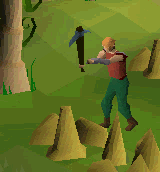“Surely
there
is
a
mine
for
…
gold.
…
Man
puts
an
end
to
darkness,
and
to
the
farthest
limit
he
searches
out
the
rock
in
gloom
and
deep
shadow.
He
sinks
a
shaft
far
from
habitation,
forgotten
by
the
foot;
they
hang
and
swing
to
and
fro
far
from
men.
The
earth,
from
it
comes
food,
and
underneath
it
is
turned
up
as
fire.
Its
rocks
are
the
source
of
sapphires,
and
its
dust
contains
gold.
…
He
puts
his
hand
on
the
flint;
he
overturns
the
mountains
at
the
base.
He
hews
out
channels
through
the
rocks;
and
his
eye
sees
anything
precious.
He
dams
up
the
streams
from
flowing;
and
what
is
hidden
he
brings
out
to
the
light.
But
where
can
wisdom
be
found?
And
where is the place of understanding?” (Job 28:1-12)
The Parable of the Gold Miner
A
gold
miner
enters
an
old
mine
shaft
abandoned
by
its
previous
worker
but
which
he
believes
holds
promise
of
a
hidden
but
rich
lode.
He
takes
his
pick
in
hand
and
begins
to
pound
away
at
the
rock
face
with
mighty
swings.
Day
after
long
day,
he
slams
that
pick
into
the
rock,
every
time
hoping
a
newly
dislodged
chunk
will
reveal
a
vein
of
gold.
Yet,
just
as
often,
as
he
hauls
out
those
rocks
to
the
light
and
inspects
them
for
signs
of
gold,
he
is
disappointed
to
find
that
only
the
same
worthless
rocks
have
been
exposed
by
the
blows
of
his
pick.
His
work
is
grueling
and
dusty.
He
exists
in
a
dark
and
lonely
world.
His
only
company
is
his
tool,
and
the
only
sound
he
hears
is
that
of
his
own
labor.
Hunger
and
weariness
replace
the
passing
sun
as
the
only
reminders
of
the
lapse
of
time.
Worst
of
all
is
the
struggle
in
the
arena
of
his
own
mind
as
he
wrestles
with
the
knowledge
that
all
his
effort
and
sacrifice
might
well
be
nothing
but
a
waste.
Yet,
he
does
not
quit.
He
knows
that
nothing
can
more
certainly
render
all
his
endeavors
vain
than
to
surrender
to
d
o
u
b
t
and
discouragement.
Who
knows?
Perhaps
the
treasure
he
seeks
lies
just
behind
that
rock
face,
where
it
awaits
just
one
or
two
more
strikes
for
its
discovery.
Only
his
continued digging will tell.
It
has
been
said
that
“the
only
bad
question
is
the
one
that
has
not
been
asked.”
This
is
not
entirely
true.
It
is
possible
to
ask
a
bad
question,
especially
if
its
result,
or
even
its
motivation,
is
to
discredit
the
truth,
distract
and
dissuade
others
from
it,
or
promote
falsehood.
Paul
refers
to
“controversial
questions
and
disputes
about
words,
out
of
which
arise
envy,
strife,
abusive
language,
evil
suspicions”
(1
Tim.
6:4)
and
tells
Timothy
to
“refuse
ignorant
and
foolish
speculations,
knowing that they produce quarrels” (2 Tim. 2:23).
Nevertheless,
an
important
vein
of
truth
runs
through
the
foregoing
assertion.
It
is
by
asking
questions
that
people
learn,
if
only
by
finding
out
that
some
questions
do
not
yield
to
answers
which
are
attainable
by
humans.
Even
that
knowledge
can
be
important,
and
it
is
knowledge
that
cannot
discovered
without
the
effort.
Furthermore,
it
is
often
in
the
search
for
knowledge
which
turns
out
to
be
unattainable
that
some
uncover
important
information
they
were
not
seeking
and
which
might
never
have
been
uncovered had that effort to find answers to other questions not been made.
As
it
is
with
this
gold
miner,
so
it
is
with
the
truth-seeker.
Answers
to
his
questions
might
long
have
eluded
him,
but
still
he
seeks
them.
He
never
knows
but
that
one
more
effort
might
reveal
them.
He
cannot
know
if
he
can
know
the
answer
to
a
question
unless
he
asks
it.
God’s
word
holds
hidden
treasures
which
can
only
be
revealed
if
the
seeker
tries
to
find
them.
Indeed,
the
Psalmist
said,
“…The
judgments
of
the
Lord
are
true;
they
are
righteous
altogether.
They
are
more
desirable
than
gold,
yes,
than
much
fine
gold
…”
(Psa.
19:9,10).
Any
time
a
person
picks
up
the
Bible
to
read
it
with
a
good
and
honest
heart,
no
matter
how
many
times
he
has
read
it
before,
he
can
be
confident
that
new
discoveries of its riches await him.













“Surely
there
is
a
mine
for
…
gold.
…
Man
puts
an
end
to
darkness,
and
to
the
farthest
limit
he
searches
out
the
rock
in
gloom
and
deep
shadow.
He
sinks
a
shaft
far
from
habitation,
forgotten
by
the
foot;
they
hang
and
swing
to
and
fro
far
from
men.
The
earth,
from
it
comes
food,
and
underneath
it
is
turned
up
as
fire.
Its
rocks
are
the
source
of
sapphires,
and
its
dust
contains
gold.
…
He
puts
his
hand
on
the
flint;
he
overturns
the
mountains
at
the
base.
He
hews
out
channels
through
the
rocks;
and
his
eye
sees
anything
precious.
He
dams
up
the
streams
from
flowing;
and
what
is
hidden
he
brings
out
to
the
light.
But
where
can
wisdom
be
found?
And
where
is
the
place
of
understanding?” (Job 28:1-12)
The Parable of the Gold Miner
A
gold
miner
enters
an
old
mine
shaft
abandoned
by
its
previous
worker
but
which
he
believes
holds
promise
of
a
hidden
but
rich
lode.
He
takes
his
pick
in
hand
and
begins
to
pound
away
at
the
rock
face
with
mighty
swings.
Day
after
long
day,
he
slams
that
pick
into
the
rock,
every
time
hoping
a
newly
dislodged
chunk
will
reveal
a
vein
of
gold.
Yet,
just
as
often,
as
he
hauls
out
those
rocks
to
the
light
and
inspects
them
for
signs
of
gold,
he
is
disappointed
to
find
that
only
the
same
worthless
rocks
have
been
exposed
by
the
blows
of
his
pick.
His
work
is
grueling
and
dusty.
He
exists
in
a
dark
and
lonely
world.
His
only
company
is
his
tool,
and
the
only
sound
he
hears
is
that
of
his
own
labor.
Hunger
and
weariness
replace
the
passing
sun
as
the
only
reminders
of
the
lapse
of
time.
Worst
of
all
is
the
struggle
in
the
arena
of
his
own
mind
as
he
wrestles
with
the
knowledge
that
all
his
effort
and
sacrifice
might
well
be
nothing
but
a
waste.
Yet,
he
does
not
quit.
He
knows
that
nothing
can
more
certainly
render
all
his
endeavors
vain
than
to
surrender
to
doubt
and
discouragement.
Who
knows?
Perhaps
the
treasure
he
seeks
lies
just
behind
that
rock
face,
where
it
awaits
just
one
or
two
more
strikes
for
its
discovery.
Only
his
continued digging will tell.
It
has
been
said
that
“the
only
bad
question
is
the
one
that
has
not
been
asked.”
This
is
not
entirely
true.
It
is
possible
to
ask
a
bad
question,
especially
if
its
result,
or
even
its
motivation,
is
to
discredit
the
truth,
distract
and
dissuade
others
from
it,
or
promote
falsehood.
Paul
refers
to
“controversial
questions
and
disputes
about
words,
out
of
which
arise
envy,
strife,
abusive
language,
evil
suspicions”
(1
Tim.
6:4)
and
tells
Timothy
to
“refuse
ignorant
and
foolish
speculations,
knowing
that
they
produce
quarrels” (2 Tim. 2:23).
Nevertheless,
an
important
vein
of
truth
runs
through
the
foregoing
assertion.
It
is
by
asking
questions
that
people
learn,
if
only
by
finding
out
that
some
questions
do
not
yield
to
answers
which
are
attainable
by
humans.
Even
that
knowledge
can
be
important,
and
it
is
knowledge
that
cannot
discovered
without
the
effort.
Furthermore,
it
is
often
in
the
search
for
knowledge
which
turns
out
to
be
unattainable
that
some
uncover
important
information
they
were
not
seeking
and
which
might
never
have
been
uncovered
had
that
effort
to
find
answers to other questions not been made.
As
it
is
with
this
gold
miner,
so
it
is
with
the
truth-
seeker.
Answers
to
his
questions
might
long
have
eluded
him,
but
still
he
seeks
them.
He
never
knows
but
that
one
more
effort
might
reveal
them.
He
cannot
know
if
he
can
know
the
answer
to
a
question
unless
he
asks
it.
God’s
word
holds
hidden
treasures
which
can
only
be
revealed
if
the
seeker
tries
to
find
them.
Indeed,
the
Psalmist
said,
“…The
judgments
of
the
Lord
are
true;
they
are
righteous
altogether.
They
are
more
desirable
than
gold,
yes,
than
much
fine
gold
…”
(Psa.
19:9,10).
Any
time
a
person
picks
up
the
Bible
to
read
it
with
a
good
and
honest
heart,
no
matter
how
many
times
he
has
read
it
before,
he
can
be
confident
that
new
discoveries
of
its
riches
await him
.












